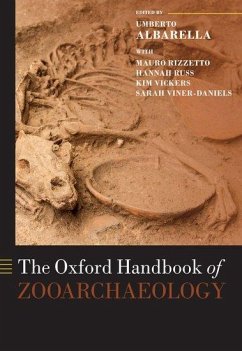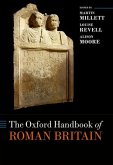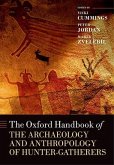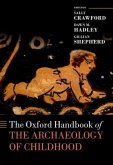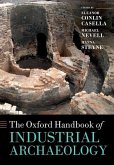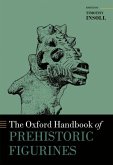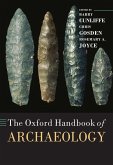The Oxford Handbook of Zooarchaeology
Herausgeber: Albarella, Umberto; Viner-Daniels, Sarah; Vickers, Kim; Russ, Hannah; Rizzetto, Mauro
The Oxford Handbook of Zooarchaeology
Herausgeber: Albarella, Umberto; Viner-Daniels, Sarah; Vickers, Kim; Russ, Hannah; Rizzetto, Mauro
- Broschiertes Buch
- Merkliste
- Auf die Merkliste
- Bewerten Bewerten
- Teilen
- Produkt teilen
- Produkterinnerung
- Produkterinnerung
The Oxford Handbook of Zooarchaeology offers a cutting-edge compendium of zooarchaeology the world over that seeks to provide a holistic view of the role played by animals in shaping human history, with case studies from five continents examining human-animal relationships across a range of geographical, historical, and cultural contexts.
Andere Kunden interessierten sich auch für
![The Oxford Handbook of Roman Britain The Oxford Handbook of Roman Britain]() The Oxford Handbook of Roman Britain55,99 €
The Oxford Handbook of Roman Britain55,99 €![The Oxford Handbook of the Archaeology and Anthropology of Hunter-Gatherers The Oxford Handbook of the Archaeology and Anthropology of Hunter-Gatherers]() The Oxford Handbook of the Archaeology and Anthropology of Hunter-Gatherers66,99 €
The Oxford Handbook of the Archaeology and Anthropology of Hunter-Gatherers66,99 €![The Oxford Handbook of the Archaeology of Childhood The Oxford Handbook of the Archaeology of Childhood]() The Oxford Handbook of the Archaeology of Childhood178,99 €
The Oxford Handbook of the Archaeology of Childhood178,99 €![The Oxford Handbook of Industrial Archaeology The Oxford Handbook of Industrial Archaeology]() The Oxford Handbook of Industrial Archaeology195,99 €
The Oxford Handbook of Industrial Archaeology195,99 €![The Oxford Handbook of Prehistoric Figurines The Oxford Handbook of Prehistoric Figurines]() The Oxford Handbook of Prehistoric Figurines240,99 €
The Oxford Handbook of Prehistoric Figurines240,99 €![The Oxford Handbook of Archaeology The Oxford Handbook of Archaeology]() The Oxford Handbook of Archaeology57,99 €
The Oxford Handbook of Archaeology57,99 €![The Oxford Handbook of European History, 1914-1945 The Oxford Handbook of European History, 1914-1945]() The Oxford Handbook of European History, 1914-194557,99 €
The Oxford Handbook of European History, 1914-194557,99 €-
-
-
The Oxford Handbook of Zooarchaeology offers a cutting-edge compendium of zooarchaeology the world over that seeks to provide a holistic view of the role played by animals in shaping human history, with case studies from five continents examining human-animal relationships across a range of geographical, historical, and cultural contexts.
Hinweis: Dieser Artikel kann nur an eine deutsche Lieferadresse ausgeliefert werden.
Hinweis: Dieser Artikel kann nur an eine deutsche Lieferadresse ausgeliefert werden.
Produktdetails
- Produktdetails
- Oxford Handbooks
- Verlag: Oxford University Press
- Seitenzahl: 864
- Erscheinungstermin: 23. September 2020
- Englisch
- Abmessung: 246mm x 176mm x 45mm
- Gewicht: 1432g
- ISBN-13: 9780198854432
- ISBN-10: 0198854439
- Artikelnr.: 59079011
- Herstellerkennzeichnung
- Libri GmbH
- Europaallee 1
- 36244 Bad Hersfeld
- gpsr@libri.de
- Oxford Handbooks
- Verlag: Oxford University Press
- Seitenzahl: 864
- Erscheinungstermin: 23. September 2020
- Englisch
- Abmessung: 246mm x 176mm x 45mm
- Gewicht: 1432g
- ISBN-13: 9780198854432
- ISBN-10: 0198854439
- Artikelnr.: 59079011
- Herstellerkennzeichnung
- Libri GmbH
- Europaallee 1
- 36244 Bad Hersfeld
- gpsr@libri.de
Umberto Albarella is a Reader in Zooarchaeology at the University of Sheffield. He obtained his PhD from the University of Durham, having first become interested in anthropology and then archaeology as an undergraduate student, and worked at the Universities of Lecce, Birmingham, and Durham before moving to the University of Sheffield in 2004. Specializing in the study of animal bones from archaeological sites, his main areas of research are wide-ranging and include animal domestication and husbandry intensification, ethnoarchaeology, the ritual use of animals, husbandry evidence of Romanization, animals and medieval life, integration in archaeology, and archaeology and politics. He is widely published in these fields and has previously served as Secretary of the International Council of Archaeozoology (ICAZ) from 2006 until 2012. Mauro Rizzetto is a PhD student at the University of Sheffield whose research concerns the development of animal husbandry during the late Roman to early medieval transition in Britain and the lower Rhine region, with particular regard to biometrical changes. He has also been working at a number of archaeological sites in Italy, Britain, France, Greece, and Spain, dating from the Neolithic to the post-medieval period. He previously obtained an undergraduate degree in Archaeological Science in 2013 and a Master's degree in Osteoarchaeology in 2015, both at the University of Sheffield. Hannah Russ is a Post-Excavation Manager at archaeology.biz and an Honorary Research fellow at the University of Wales, Trinity Saint David. She is a zooarchaeologist specializing in the study of aquatic animals, including fish, molluscs, and crustaceans, and has worked on remains from five UNESCO World Heritage sites, as well as other sites in Western Europe and the Middle East dating from the Upper Palaeolithic through to the post-medieval period. Hannah completed her PhD in Archaeological Sciences in 2011 at the University of Bradford and subsequently held positions at the University of Sheffield and Oxford Brookes University. She was appointed a Fellow of the Society of Antiquaries of London (FSA) in 2019. Kim Vickers completed her PhD on the palaeoentomology of the North Atlantic islands in 2007. Her research has focused on the environmental impact of medieval human settlement and activity in Iceland, Greenland, and the Faroe islands, and on the nature of resource use and contact between Norse and Inuit cultures in Greenland, while her other research interests include the Iron Age to Roman transition in Britain and the effects of the Roman invasion of Britain on farming practices and animal husbandry in the early first millennium AD. Sarah Viner-Daniels completed her PhD at the University of Sheffield and was subsequently appointed as a Research Associate to the Feeding Stonehenge project. Her main areas of interest include animal exploitation in Mesolithic and Neolithic Britain and the application of isotopic analysis (using strontium and oxygen) to the understanding of prehistoric livestock mobility.
* List of Figures
* List of Tables
* Note on Online Supplementary Material
* I. INTRODUCTION
* 1: Umberto Albarella: Zooarchaeology in the twenty-first century:
where we come from, where we are now, and where we are going
* II. EUROPE
* 2: Mietje Germonpré and Mikhail V. Sablin: Humans and mammals in the
Upper Palaeolithic of Russia
* 3: Katherine Boyle: The zooarchaeology of complexity and
specialization during the Upper Palaeolithic in Western Europe:
changing diversity and evenness
* 4: Lembi Lõugas: Mesolithic hunting and fishing in the coastal and
terrestrial environments of the eastern Baltic
* 5: Jean-Denis Vigne: Archaeozoological techniques and protocols for
elaborating scenarios of early colonization and Neolithization of
Cyprus
* 6: Jörg Schibler: Zooarchaeological results from Neolithic and Bronze
Age wetland and dryland sites in the Central Alpine Foreland:
economic, ecologic, and taphonomic relevance
* 7: László Bartosiewicz: Zooarchaeology in the Carpathian Basin and
adjacent areas
* 8: Paul Halstead and Valasia Isaakidou: Sheep, sacrifices, and
symbols: animals in Later Bronze Age Greece
* 9: Jacopo De Grossi Mazzorin and Claudia Minniti: Changes in
lifestyle in ancient Rome (Italy) across the Iron Age/Roman
transition: the evidence from animal remains
* 10: Konrad Smiarowski, Ramona Harrison, Seth Brewington, Megan Hicks,
Frank J. Feeley, Céline Dupont-Hébert, Brenda Prehal, George
Hambrecht, James Woollett, and Thomas H. McGovern: Zooarchaeology of
the Scandinavian settlements in Iceland and Greenland: diverging
pathways
* 11: Dale Serjeantson: Fishing, wildfowling, and marine mammal
exploitation in northern Scotland from prehistory to Early Modern
times
* 12: Simon J. M. Davis: Zooarchaeological evidence for Muslim
improvement of sheep (Ovis aries) in Portugal
* 13: Finbar McCormick and Emily Murray: The zooarchaeology of Medieval
Ireland
* 14: Terry O'Connor: Animals in urban life in Medieval to Early Modern
England
* 15: Mark Maltby: From bovid to beaver: mammal exploitation in
Medieval northwest Russia
* III. ASIA
* 16: Joris Peters, Nadja Pöllath, and Benjamin S. Arbuckle: The
emergence of livestock husbandry in Early Neolithic Anatolia
* 17: Canan Çak¿rlar and Levent Atici: Patterns of animal exploitation
in western Turkey: from Palaeolithic molluscs to Byzantine elephants
* 18: Ajita K. Patel and Richard H. Meadow: South Asian contributions
to animal domestication and pastoralism: bones, genes, and
archaeology
* 19: Li Liu and Xiaolin Ma: The zooarchaeology of Neolithic China
* 20: Norbert Benecke: Subsistence economy, animal domestication, and
herd management in prehistoric central Asia (Neolithic - Iron Age)
* 21: Hitomi Hongo: Introduction of domestic animals to the Japanese
archipelago
* 22: Charles F. W. Higham: Farming, social change, and state formation
in south-east Asia
* 23: Justin E. Lev-Tov and Sarah Whitcher Kansa: The zooarchaeology of
early historic periods in the southern Levant
* IV. AFRICA
* 24: Ina Plug: Middle and Later Stone Age hunters and their prey in
southern Africa
* 25: Diane Gifford-Gonzalez: Pastoralism in sub-Saharan Africa:
emergence and ramifications
* 26: Louis Chaix: Cattle, a major component of the Kerma culture
(Sudan)
* 27: Shaw Badenhorst: The zooarchaeology of Iron Age farmers from
southern Africa
* 28: Veerle Linseele: The exploitation of aquatic resources in
Holocene West Africa
* 29: Salima Ikram: Animals in ancient Egyptian religion: belief,
identity, power, and economy
* 30: Michael MacKinnon: Animals, acculturation, and colonization in
ancient and Islamic North Africa
* 31: Adam R. Heinrich: Historical zooarchaeology of colonialism,
mercantilism, and indigenous dispossession: the Dutch East India
Company's meat industry at the Cape of Good Hope, South Africa
* V. NORTH AMERICA
* 32: Gregory G. Monks: Zooarchaeology of the pre-Contact Northwest
coast of North America
* 33: Rebecca M. Dean: Fauna and the emergence of intensive
agricultural economies in the United States Southwest
* 34: John D. Speth: 13,000 years of communal bison hunting in western
North America
* 35: Joaquín Arroyo-Cabrales and Eduardo Corona-M.: Advances in
hunter-gatherer research in Mexico: archaeozoological contributions
* 36: Tanya M. Peres: The exploitation of aquatic environments by the
Olmec and Epi-Olmec
* 37: Heather A. Lapham: Tracking the trade in animal pelts in early
historic eastern North America
* 38: Elizabeth J. Reitz: Animal use at early colonies on the
south-eastern coast of the United States
* 39: Kitty F. Emery: Zooarchaeology of the Maya
* VI. SOUTH AMERICA
* 40: Peter W. Stahl: Zooarchaeological approaches to Pre-Columbian
archaeology in the neotropics of northwestern South America
* 41: Daniela Klokler: Zooarchaeology of Brazilian shell mounds
* 42: Guillermo L. Mengoni Goñalons: Camelid hunting and herding in
Inca times: a view from the South of the empire
* 43: Luis A. Borrero: Forests, steppes, and coastlines: zooarchaeology
and the prehistoric exploitation of Patagonian habitats
* VII. OCEANIA
* 44: Matthew Leavesley: Themes in the Zooarchaeology of Pleistocene
Melanesia
* 45: Richard Cosgrove and Jillian Garvey: Behavioural inferences from
Late Pleistocene aboriginal Australia: seasonality, butchery, and
nutrition in southwest Tasmania
* 46: Ian Smith: Regional and chronological variations in energy
harvests from prehistoric fauna in New Zealand
* 47: Melinda S. Allen: Spatial variability and human eco-dynamics in
central-east Polynesian fisheries
* A Glossary of Zooarchaeological Methods
* Notes on Contributors
* Index
* List of Tables
* Note on Online Supplementary Material
* I. INTRODUCTION
* 1: Umberto Albarella: Zooarchaeology in the twenty-first century:
where we come from, where we are now, and where we are going
* II. EUROPE
* 2: Mietje Germonpré and Mikhail V. Sablin: Humans and mammals in the
Upper Palaeolithic of Russia
* 3: Katherine Boyle: The zooarchaeology of complexity and
specialization during the Upper Palaeolithic in Western Europe:
changing diversity and evenness
* 4: Lembi Lõugas: Mesolithic hunting and fishing in the coastal and
terrestrial environments of the eastern Baltic
* 5: Jean-Denis Vigne: Archaeozoological techniques and protocols for
elaborating scenarios of early colonization and Neolithization of
Cyprus
* 6: Jörg Schibler: Zooarchaeological results from Neolithic and Bronze
Age wetland and dryland sites in the Central Alpine Foreland:
economic, ecologic, and taphonomic relevance
* 7: László Bartosiewicz: Zooarchaeology in the Carpathian Basin and
adjacent areas
* 8: Paul Halstead and Valasia Isaakidou: Sheep, sacrifices, and
symbols: animals in Later Bronze Age Greece
* 9: Jacopo De Grossi Mazzorin and Claudia Minniti: Changes in
lifestyle in ancient Rome (Italy) across the Iron Age/Roman
transition: the evidence from animal remains
* 10: Konrad Smiarowski, Ramona Harrison, Seth Brewington, Megan Hicks,
Frank J. Feeley, Céline Dupont-Hébert, Brenda Prehal, George
Hambrecht, James Woollett, and Thomas H. McGovern: Zooarchaeology of
the Scandinavian settlements in Iceland and Greenland: diverging
pathways
* 11: Dale Serjeantson: Fishing, wildfowling, and marine mammal
exploitation in northern Scotland from prehistory to Early Modern
times
* 12: Simon J. M. Davis: Zooarchaeological evidence for Muslim
improvement of sheep (Ovis aries) in Portugal
* 13: Finbar McCormick and Emily Murray: The zooarchaeology of Medieval
Ireland
* 14: Terry O'Connor: Animals in urban life in Medieval to Early Modern
England
* 15: Mark Maltby: From bovid to beaver: mammal exploitation in
Medieval northwest Russia
* III. ASIA
* 16: Joris Peters, Nadja Pöllath, and Benjamin S. Arbuckle: The
emergence of livestock husbandry in Early Neolithic Anatolia
* 17: Canan Çak¿rlar and Levent Atici: Patterns of animal exploitation
in western Turkey: from Palaeolithic molluscs to Byzantine elephants
* 18: Ajita K. Patel and Richard H. Meadow: South Asian contributions
to animal domestication and pastoralism: bones, genes, and
archaeology
* 19: Li Liu and Xiaolin Ma: The zooarchaeology of Neolithic China
* 20: Norbert Benecke: Subsistence economy, animal domestication, and
herd management in prehistoric central Asia (Neolithic - Iron Age)
* 21: Hitomi Hongo: Introduction of domestic animals to the Japanese
archipelago
* 22: Charles F. W. Higham: Farming, social change, and state formation
in south-east Asia
* 23: Justin E. Lev-Tov and Sarah Whitcher Kansa: The zooarchaeology of
early historic periods in the southern Levant
* IV. AFRICA
* 24: Ina Plug: Middle and Later Stone Age hunters and their prey in
southern Africa
* 25: Diane Gifford-Gonzalez: Pastoralism in sub-Saharan Africa:
emergence and ramifications
* 26: Louis Chaix: Cattle, a major component of the Kerma culture
(Sudan)
* 27: Shaw Badenhorst: The zooarchaeology of Iron Age farmers from
southern Africa
* 28: Veerle Linseele: The exploitation of aquatic resources in
Holocene West Africa
* 29: Salima Ikram: Animals in ancient Egyptian religion: belief,
identity, power, and economy
* 30: Michael MacKinnon: Animals, acculturation, and colonization in
ancient and Islamic North Africa
* 31: Adam R. Heinrich: Historical zooarchaeology of colonialism,
mercantilism, and indigenous dispossession: the Dutch East India
Company's meat industry at the Cape of Good Hope, South Africa
* V. NORTH AMERICA
* 32: Gregory G. Monks: Zooarchaeology of the pre-Contact Northwest
coast of North America
* 33: Rebecca M. Dean: Fauna and the emergence of intensive
agricultural economies in the United States Southwest
* 34: John D. Speth: 13,000 years of communal bison hunting in western
North America
* 35: Joaquín Arroyo-Cabrales and Eduardo Corona-M.: Advances in
hunter-gatherer research in Mexico: archaeozoological contributions
* 36: Tanya M. Peres: The exploitation of aquatic environments by the
Olmec and Epi-Olmec
* 37: Heather A. Lapham: Tracking the trade in animal pelts in early
historic eastern North America
* 38: Elizabeth J. Reitz: Animal use at early colonies on the
south-eastern coast of the United States
* 39: Kitty F. Emery: Zooarchaeology of the Maya
* VI. SOUTH AMERICA
* 40: Peter W. Stahl: Zooarchaeological approaches to Pre-Columbian
archaeology in the neotropics of northwestern South America
* 41: Daniela Klokler: Zooarchaeology of Brazilian shell mounds
* 42: Guillermo L. Mengoni Goñalons: Camelid hunting and herding in
Inca times: a view from the South of the empire
* 43: Luis A. Borrero: Forests, steppes, and coastlines: zooarchaeology
and the prehistoric exploitation of Patagonian habitats
* VII. OCEANIA
* 44: Matthew Leavesley: Themes in the Zooarchaeology of Pleistocene
Melanesia
* 45: Richard Cosgrove and Jillian Garvey: Behavioural inferences from
Late Pleistocene aboriginal Australia: seasonality, butchery, and
nutrition in southwest Tasmania
* 46: Ian Smith: Regional and chronological variations in energy
harvests from prehistoric fauna in New Zealand
* 47: Melinda S. Allen: Spatial variability and human eco-dynamics in
central-east Polynesian fisheries
* A Glossary of Zooarchaeological Methods
* Notes on Contributors
* Index
* List of Figures
* List of Tables
* Note on Online Supplementary Material
* I. INTRODUCTION
* 1: Umberto Albarella: Zooarchaeology in the twenty-first century:
where we come from, where we are now, and where we are going
* II. EUROPE
* 2: Mietje Germonpré and Mikhail V. Sablin: Humans and mammals in the
Upper Palaeolithic of Russia
* 3: Katherine Boyle: The zooarchaeology of complexity and
specialization during the Upper Palaeolithic in Western Europe:
changing diversity and evenness
* 4: Lembi Lõugas: Mesolithic hunting and fishing in the coastal and
terrestrial environments of the eastern Baltic
* 5: Jean-Denis Vigne: Archaeozoological techniques and protocols for
elaborating scenarios of early colonization and Neolithization of
Cyprus
* 6: Jörg Schibler: Zooarchaeological results from Neolithic and Bronze
Age wetland and dryland sites in the Central Alpine Foreland:
economic, ecologic, and taphonomic relevance
* 7: László Bartosiewicz: Zooarchaeology in the Carpathian Basin and
adjacent areas
* 8: Paul Halstead and Valasia Isaakidou: Sheep, sacrifices, and
symbols: animals in Later Bronze Age Greece
* 9: Jacopo De Grossi Mazzorin and Claudia Minniti: Changes in
lifestyle in ancient Rome (Italy) across the Iron Age/Roman
transition: the evidence from animal remains
* 10: Konrad Smiarowski, Ramona Harrison, Seth Brewington, Megan Hicks,
Frank J. Feeley, Céline Dupont-Hébert, Brenda Prehal, George
Hambrecht, James Woollett, and Thomas H. McGovern: Zooarchaeology of
the Scandinavian settlements in Iceland and Greenland: diverging
pathways
* 11: Dale Serjeantson: Fishing, wildfowling, and marine mammal
exploitation in northern Scotland from prehistory to Early Modern
times
* 12: Simon J. M. Davis: Zooarchaeological evidence for Muslim
improvement of sheep (Ovis aries) in Portugal
* 13: Finbar McCormick and Emily Murray: The zooarchaeology of Medieval
Ireland
* 14: Terry O'Connor: Animals in urban life in Medieval to Early Modern
England
* 15: Mark Maltby: From bovid to beaver: mammal exploitation in
Medieval northwest Russia
* III. ASIA
* 16: Joris Peters, Nadja Pöllath, and Benjamin S. Arbuckle: The
emergence of livestock husbandry in Early Neolithic Anatolia
* 17: Canan Çak¿rlar and Levent Atici: Patterns of animal exploitation
in western Turkey: from Palaeolithic molluscs to Byzantine elephants
* 18: Ajita K. Patel and Richard H. Meadow: South Asian contributions
to animal domestication and pastoralism: bones, genes, and
archaeology
* 19: Li Liu and Xiaolin Ma: The zooarchaeology of Neolithic China
* 20: Norbert Benecke: Subsistence economy, animal domestication, and
herd management in prehistoric central Asia (Neolithic - Iron Age)
* 21: Hitomi Hongo: Introduction of domestic animals to the Japanese
archipelago
* 22: Charles F. W. Higham: Farming, social change, and state formation
in south-east Asia
* 23: Justin E. Lev-Tov and Sarah Whitcher Kansa: The zooarchaeology of
early historic periods in the southern Levant
* IV. AFRICA
* 24: Ina Plug: Middle and Later Stone Age hunters and their prey in
southern Africa
* 25: Diane Gifford-Gonzalez: Pastoralism in sub-Saharan Africa:
emergence and ramifications
* 26: Louis Chaix: Cattle, a major component of the Kerma culture
(Sudan)
* 27: Shaw Badenhorst: The zooarchaeology of Iron Age farmers from
southern Africa
* 28: Veerle Linseele: The exploitation of aquatic resources in
Holocene West Africa
* 29: Salima Ikram: Animals in ancient Egyptian religion: belief,
identity, power, and economy
* 30: Michael MacKinnon: Animals, acculturation, and colonization in
ancient and Islamic North Africa
* 31: Adam R. Heinrich: Historical zooarchaeology of colonialism,
mercantilism, and indigenous dispossession: the Dutch East India
Company's meat industry at the Cape of Good Hope, South Africa
* V. NORTH AMERICA
* 32: Gregory G. Monks: Zooarchaeology of the pre-Contact Northwest
coast of North America
* 33: Rebecca M. Dean: Fauna and the emergence of intensive
agricultural economies in the United States Southwest
* 34: John D. Speth: 13,000 years of communal bison hunting in western
North America
* 35: Joaquín Arroyo-Cabrales and Eduardo Corona-M.: Advances in
hunter-gatherer research in Mexico: archaeozoological contributions
* 36: Tanya M. Peres: The exploitation of aquatic environments by the
Olmec and Epi-Olmec
* 37: Heather A. Lapham: Tracking the trade in animal pelts in early
historic eastern North America
* 38: Elizabeth J. Reitz: Animal use at early colonies on the
south-eastern coast of the United States
* 39: Kitty F. Emery: Zooarchaeology of the Maya
* VI. SOUTH AMERICA
* 40: Peter W. Stahl: Zooarchaeological approaches to Pre-Columbian
archaeology in the neotropics of northwestern South America
* 41: Daniela Klokler: Zooarchaeology of Brazilian shell mounds
* 42: Guillermo L. Mengoni Goñalons: Camelid hunting and herding in
Inca times: a view from the South of the empire
* 43: Luis A. Borrero: Forests, steppes, and coastlines: zooarchaeology
and the prehistoric exploitation of Patagonian habitats
* VII. OCEANIA
* 44: Matthew Leavesley: Themes in the Zooarchaeology of Pleistocene
Melanesia
* 45: Richard Cosgrove and Jillian Garvey: Behavioural inferences from
Late Pleistocene aboriginal Australia: seasonality, butchery, and
nutrition in southwest Tasmania
* 46: Ian Smith: Regional and chronological variations in energy
harvests from prehistoric fauna in New Zealand
* 47: Melinda S. Allen: Spatial variability and human eco-dynamics in
central-east Polynesian fisheries
* A Glossary of Zooarchaeological Methods
* Notes on Contributors
* Index
* List of Tables
* Note on Online Supplementary Material
* I. INTRODUCTION
* 1: Umberto Albarella: Zooarchaeology in the twenty-first century:
where we come from, where we are now, and where we are going
* II. EUROPE
* 2: Mietje Germonpré and Mikhail V. Sablin: Humans and mammals in the
Upper Palaeolithic of Russia
* 3: Katherine Boyle: The zooarchaeology of complexity and
specialization during the Upper Palaeolithic in Western Europe:
changing diversity and evenness
* 4: Lembi Lõugas: Mesolithic hunting and fishing in the coastal and
terrestrial environments of the eastern Baltic
* 5: Jean-Denis Vigne: Archaeozoological techniques and protocols for
elaborating scenarios of early colonization and Neolithization of
Cyprus
* 6: Jörg Schibler: Zooarchaeological results from Neolithic and Bronze
Age wetland and dryland sites in the Central Alpine Foreland:
economic, ecologic, and taphonomic relevance
* 7: László Bartosiewicz: Zooarchaeology in the Carpathian Basin and
adjacent areas
* 8: Paul Halstead and Valasia Isaakidou: Sheep, sacrifices, and
symbols: animals in Later Bronze Age Greece
* 9: Jacopo De Grossi Mazzorin and Claudia Minniti: Changes in
lifestyle in ancient Rome (Italy) across the Iron Age/Roman
transition: the evidence from animal remains
* 10: Konrad Smiarowski, Ramona Harrison, Seth Brewington, Megan Hicks,
Frank J. Feeley, Céline Dupont-Hébert, Brenda Prehal, George
Hambrecht, James Woollett, and Thomas H. McGovern: Zooarchaeology of
the Scandinavian settlements in Iceland and Greenland: diverging
pathways
* 11: Dale Serjeantson: Fishing, wildfowling, and marine mammal
exploitation in northern Scotland from prehistory to Early Modern
times
* 12: Simon J. M. Davis: Zooarchaeological evidence for Muslim
improvement of sheep (Ovis aries) in Portugal
* 13: Finbar McCormick and Emily Murray: The zooarchaeology of Medieval
Ireland
* 14: Terry O'Connor: Animals in urban life in Medieval to Early Modern
England
* 15: Mark Maltby: From bovid to beaver: mammal exploitation in
Medieval northwest Russia
* III. ASIA
* 16: Joris Peters, Nadja Pöllath, and Benjamin S. Arbuckle: The
emergence of livestock husbandry in Early Neolithic Anatolia
* 17: Canan Çak¿rlar and Levent Atici: Patterns of animal exploitation
in western Turkey: from Palaeolithic molluscs to Byzantine elephants
* 18: Ajita K. Patel and Richard H. Meadow: South Asian contributions
to animal domestication and pastoralism: bones, genes, and
archaeology
* 19: Li Liu and Xiaolin Ma: The zooarchaeology of Neolithic China
* 20: Norbert Benecke: Subsistence economy, animal domestication, and
herd management in prehistoric central Asia (Neolithic - Iron Age)
* 21: Hitomi Hongo: Introduction of domestic animals to the Japanese
archipelago
* 22: Charles F. W. Higham: Farming, social change, and state formation
in south-east Asia
* 23: Justin E. Lev-Tov and Sarah Whitcher Kansa: The zooarchaeology of
early historic periods in the southern Levant
* IV. AFRICA
* 24: Ina Plug: Middle and Later Stone Age hunters and their prey in
southern Africa
* 25: Diane Gifford-Gonzalez: Pastoralism in sub-Saharan Africa:
emergence and ramifications
* 26: Louis Chaix: Cattle, a major component of the Kerma culture
(Sudan)
* 27: Shaw Badenhorst: The zooarchaeology of Iron Age farmers from
southern Africa
* 28: Veerle Linseele: The exploitation of aquatic resources in
Holocene West Africa
* 29: Salima Ikram: Animals in ancient Egyptian religion: belief,
identity, power, and economy
* 30: Michael MacKinnon: Animals, acculturation, and colonization in
ancient and Islamic North Africa
* 31: Adam R. Heinrich: Historical zooarchaeology of colonialism,
mercantilism, and indigenous dispossession: the Dutch East India
Company's meat industry at the Cape of Good Hope, South Africa
* V. NORTH AMERICA
* 32: Gregory G. Monks: Zooarchaeology of the pre-Contact Northwest
coast of North America
* 33: Rebecca M. Dean: Fauna and the emergence of intensive
agricultural economies in the United States Southwest
* 34: John D. Speth: 13,000 years of communal bison hunting in western
North America
* 35: Joaquín Arroyo-Cabrales and Eduardo Corona-M.: Advances in
hunter-gatherer research in Mexico: archaeozoological contributions
* 36: Tanya M. Peres: The exploitation of aquatic environments by the
Olmec and Epi-Olmec
* 37: Heather A. Lapham: Tracking the trade in animal pelts in early
historic eastern North America
* 38: Elizabeth J. Reitz: Animal use at early colonies on the
south-eastern coast of the United States
* 39: Kitty F. Emery: Zooarchaeology of the Maya
* VI. SOUTH AMERICA
* 40: Peter W. Stahl: Zooarchaeological approaches to Pre-Columbian
archaeology in the neotropics of northwestern South America
* 41: Daniela Klokler: Zooarchaeology of Brazilian shell mounds
* 42: Guillermo L. Mengoni Goñalons: Camelid hunting and herding in
Inca times: a view from the South of the empire
* 43: Luis A. Borrero: Forests, steppes, and coastlines: zooarchaeology
and the prehistoric exploitation of Patagonian habitats
* VII. OCEANIA
* 44: Matthew Leavesley: Themes in the Zooarchaeology of Pleistocene
Melanesia
* 45: Richard Cosgrove and Jillian Garvey: Behavioural inferences from
Late Pleistocene aboriginal Australia: seasonality, butchery, and
nutrition in southwest Tasmania
* 46: Ian Smith: Regional and chronological variations in energy
harvests from prehistoric fauna in New Zealand
* 47: Melinda S. Allen: Spatial variability and human eco-dynamics in
central-east Polynesian fisheries
* A Glossary of Zooarchaeological Methods
* Notes on Contributors
* Index

